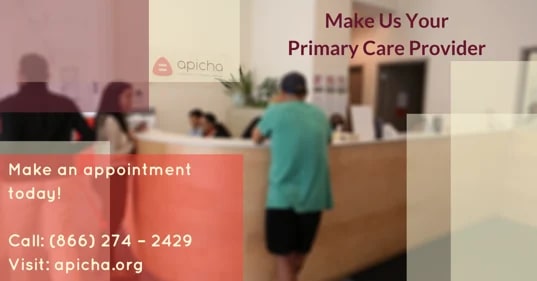10 Reasons You Need PCP
- Category: Health & Wellness
- Posted On:
- Written By: Apicha Community Health Center
First of all, you may be wondering “PCP? Why is this community health center saying I need PCP?” Well, we’re talking about the importance of getting a Primary Care Provider of course.
Are you now wondering what it means to have primary medical care? Primary care means frontline care, and it can come from doctors (family physicians, internists, or pediatricians), physician assistants, or nurse practitioners.
Primary care clinicians make sure that their patients and their issues don’t fall through the cracks of our increasingly confusing health care system. They care for their patients across the spectrum of their care.
According to the CDC, its latest report stated that 82.1% of adults have had contact with a health care professional within the year. It’s important to have a PCP but you may be thinking: “I’m young and healthy. Why should I spend my time and money going to see a PCP?” So we’ve done the homework for you and have made a list of reasons why you should have primary medical care.
Ten Reasons Why You Need a Primary Medical Care Provider

- A Central Point of Contact - PCPs help to coordinate patient care all in one place. Within a PCP’s practice, you have the ability to access a wide spectrum of health services, including preventive care, such as cancer screenings; chronic care for conditions like asthma, hypertension, and diabetes; and acute care for symptoms like cough, stomach pain, or high fever.
- Continuity of Care – Continuity of care dramatically increases the likelihood that you’ll receive a correct diagnosis and appropriate treatment. By being able to track your health over time, your PCP can gain valuable information that can help you get the best healthcare for you.
- Better Preventative Care - If you come in for regular physicals instead of only coming in when you’re sick, your primary provider can help educate you about your health and prevent chronic illnesses down the line. They’ll know your family history and can help you watch out for chronic illnesses your family is prone to.
- Save Time Down the Line - Setting up a relationship with a consistent provider can help you get care more quickly should you get sick in the future–whether it’s a pesky sinus infection or something more serious.
- A Key Resource - Your PCP should be the first person in the healthcare system that you contact when you have a question or a problem. They can provide the answers and care that you need. Your doctor can also help you find other resources, such as support groups and classes.
- Lower Overall Health Care Costs – Going to regular appointments with your PCP may seem like a waste of time and money if you’re healthy, but research from the Journal of Health Affairs suggests that routine appointments with a primary care doctor cut overall health costs for patients. Regular screenings, open communication between you and your doctor, and a record of your health history all contribute to an overall lower cost of health care.
- A Higher Level of Satisfaction With Their Care - Researchers at the Journal of Health Affairs found that patients with primary care doctors reported higher levels of satisfaction than patients without primary care doctors. The more you visit a doctor you trust, the better your relationship with him or her and the better your care.
- Referrals to Other Medical Specialists - They can help refer you to the right specialists. You may think your chest pains require you to see the cardiologists when you are actually experiencing lung problems and need to see a pulmonologist. Chances are your doctor has helpful recommendations for specialists since he or she is familiar with how you prefer to participate in your health care.
- Decrease in Hospital and ER Visits - Research shows that patients who regularly visit their primary care physicians have fewer hospitalizations and emergency visits than those who do not utilize primary care doctors. Waiting too long to see a doctor or ignoring symptoms can lead to a hospitalization or an ER visit, two of the most expensive and overwhelming outcomes for patients.
- Better Management of Chronic Diseases - Chronic health conditions like diabetes, arthritis and lupus are often difficult to monitor by yourself. A primary care doctor can help you stay organized and aware of how your chronic disease is affecting your body. Scheduling regular visits and performing routine tests are two ways your doctor can help you better maintain your chronic disease.
Let Apicha Community Health Center Be Your Primary Care Provider
Don't bother googling "primary care nyc". Apicha CHC is growing and accepting new patients! Here’s what you can expect if you choose us to be your PCP:
- You will have your own PCP who understands you and your health care needs.
- You will get regular check-ups for diabetes, cholesterol, blood pressure.
- You will get necessary vaccines and cancer screenings appropriate for you.
- If you smoke we can work with you to help you stop smoking.
- Medication prescriptions and assistance with prior authorizations.
- You will be screened for depression and anxiety. If needed, you will have access to Apicha CHC’s on-site Behavioral Health Specialists.
- You can get a same or next day appointment when you are sick and you will be seen by a provider that knows you.
- You can see our Registered Dietitian for nutrition counseling and weight management.
- For the things we cannot address at Apicha CHC, we will help you find a specialist and help coordinate your care.
- You may have access to reduced cost medication.
You can schedule an appointment by calling 866-274-2429 or click here. If you have more questions about becoming a new patient, click here for more information.
